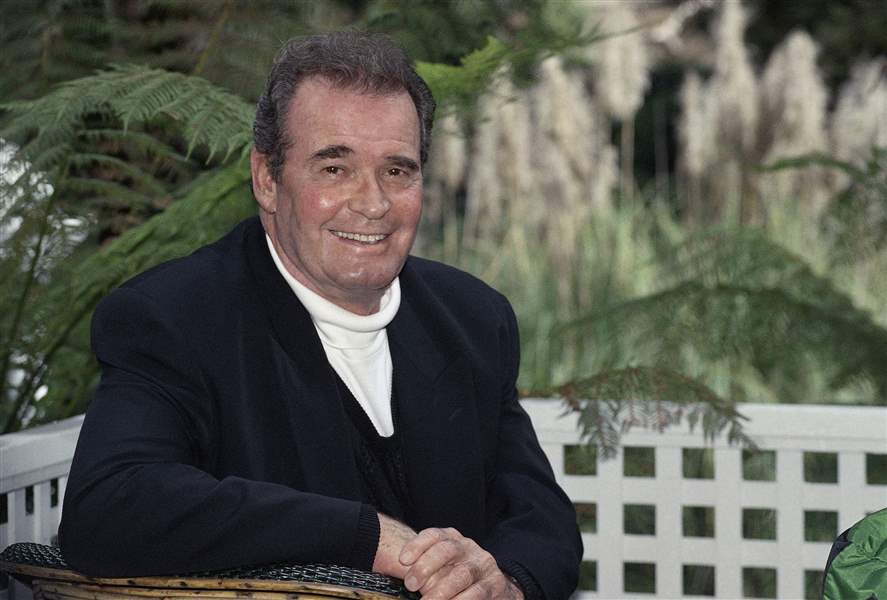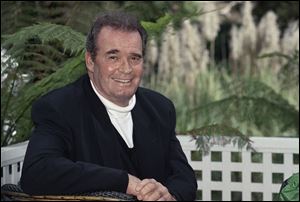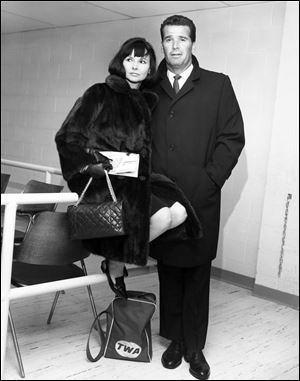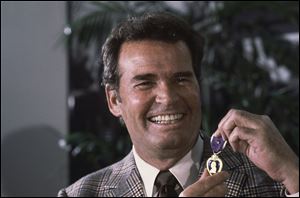
APPRECIATION
Garner created new kind of hero
From Maverick to Rockford Files, actor entertained
7/22/2014
Garner in 2009

Garner in 2009

Actor James Garner, right, and his wife Lois are shown in the Trans World Flight Center prior to boarding a TWA Jetliner enroute to London in this Feb. 21, 1964 file photo taken in New York.
I secretly always wanted to marry James Garner, and was foiled only by the fact that, as humorist Jean Kerr once wrote of her designs on George S. Kaufman, he was already married and I never met him.
I cannot imagine I was alone in this desire — in her introduction to Garner’s 2011 memoir, Julie Andrews revealed a similar devotion and for pretty much the same reasons I had: Garner, who died at home Saturday at age 86, effortlessly combined strength and humility, humor and capability, frankness and empathy to create an ideal alpha-male, of the sort that hadn’t existed before, at least not in drama. He constructed a new kind of hero, one who would much rather be playing cards or going fishing. But all right, if no one else was going to save the girl, or solve the case, or prevent the crime, well, then he’d do it.
When he brought this persona to life in Maverick and then again in The Rockford Files, he all but rebuilt an archetype. Before Garner, heroes were heroes, which meant, nine times out of 10, they were boring. After Garner, they could be funny, irritating, lazy, fearful, and complicated. Without Garner there would be no Indiana Jones, no Starsky and Hutch, no Gregory House.
Unlike virtually any other TV hero before them, Bret Maverick and James Rockford (who was, after all, also written by Roy Huggins as a revamp of Bret) eschewed guns and violence, preferring to talk their way into and out of trouble. In another actor’s hands, both would have been supporting roles, the weaselly if likable friend of the more macho lead. But Garner, with his great hair, handsome face, and “relax, fellas” demeanor, managed to make even an aversion to physicality manly — his breakout movie role was a soldier who adhered to deeply held convictions of wartime cowardice in The Americanization of Emily, but still got the girl.
Tall and broad, Garner was clearly capable of taking down any bad guy, he would just rather not.
This is not to say he was one-note. In a career that spanned six decades, Garner played every sort of man: the scrounger in The Great Escape, the oblivious American gangster in Victor, Victoria, the quiet but passionate neighbor in Murphy’s Romance, the devoted husband in The Notebook. He appeared with Tommy Lee Jones and Clint Eastwood in Space Cowboys, stepped in as Grandpa Egan on 8 Simple Rules after the death of series star John Ritter in 2003. But to all he brought an essential decency, a quick intellect, and an admirable intolerance for delusion, denial, and other forms of bull.

Actor James Garner, left, smiles as he holds up the Purple Heart medal presented to him in a ceremony in this Monday, Jan. 24, 1983 file photo taken Los Angeles, Calif. Garner was wounded in April 1951 while with U.S. Forces in Korea, but his medal was never presented to him.
Garner, who hesitated in taking the role in Murphy’s Romance because he thought he was too old to play a romantic lead, had an air of self-awareness that he used to ground his characters.
It wasn’t humility so much as a sense of proportion, something so unusual in a lead actor that it became a hallmark of him — he didn’t think too much or too little of himself because he’d rather not be thinking of himself.
More than anything, he was a star who didn’t appear to need every ounce of oxygen in the vicinity to shine. And as with Halley’s Comet and other rare celestial objects, it will be a few years before we see anything like him again.